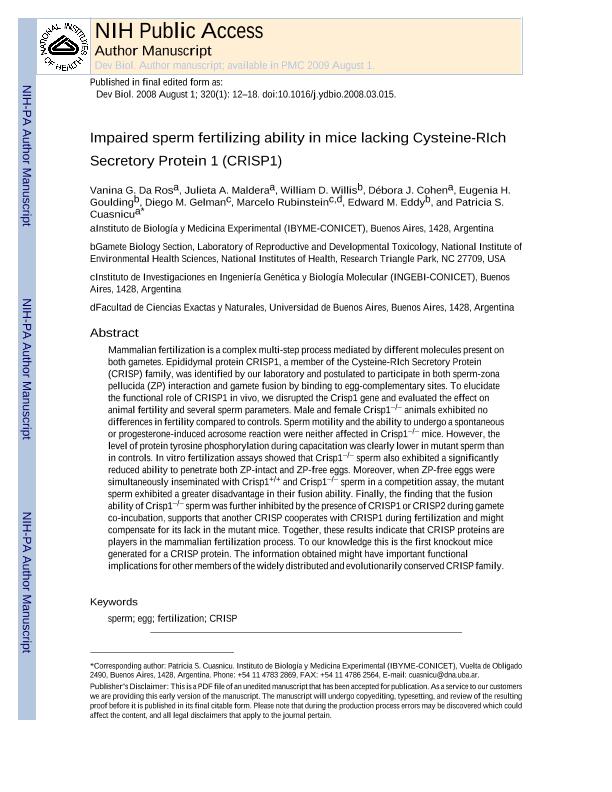Artículo
Impaired sperm fertilizing ability in mice lacking Cysteine-RIch Secretory Protein 1 (CRISP1)
Da Ros, Vanina Gabriela ; Maldera, Julieta Antonella
; Maldera, Julieta Antonella ; Willis, William D.; Cohen, Debora Juana
; Willis, William D.; Cohen, Debora Juana ; Goulding, Eugenia H.; Gelman, Diego Matias
; Goulding, Eugenia H.; Gelman, Diego Matias ; Rubinstein, Marcelo
; Rubinstein, Marcelo ; Eddy, Edward M.; Cuasnicu, Patricia Sara
; Eddy, Edward M.; Cuasnicu, Patricia Sara
 ; Maldera, Julieta Antonella
; Maldera, Julieta Antonella ; Willis, William D.; Cohen, Debora Juana
; Willis, William D.; Cohen, Debora Juana ; Goulding, Eugenia H.; Gelman, Diego Matias
; Goulding, Eugenia H.; Gelman, Diego Matias ; Rubinstein, Marcelo
; Rubinstein, Marcelo ; Eddy, Edward M.; Cuasnicu, Patricia Sara
; Eddy, Edward M.; Cuasnicu, Patricia Sara
Fecha de publicación:
12/2008
Editorial:
Elsevier
Revista:
Developmental Biology
ISSN:
0012-1606
e-ISSN:
1095-564X
Idioma:
Inglés
Tipo de recurso:
Artículo publicado
Clasificación temática:
Resumen
Mammalian fertilization is a complex multi-step process mediated by different molecules present on both gametes. Epididymal protein CRISP1, a member of the Cysteine-RIch Secretory Protein (CRISP) family, was identified by our laboratory and postulated to participate in both sperm-zona pellucida (ZP) interaction and gamete fusion by binding to egg-complementary sites. To elucidate the functional role of CRISP1 in vivo, we disrupted the Crisp1 gene and evaluated the effect on animal fertility and several sperm parameters. Male and female Crisp1(-/-) animals exhibited no differences in fertility compared to controls. Sperm motility and the ability to undergo a spontaneous or progesterone-induced acrosome reaction were neither affected in Crisp1(-/-) mice. However, the level of protein tyrosine phosphorylation during capacitation was clearly lower in mutant sperm than in controls. In vitro fertilization assays showed that Crisp1(-/-) sperm also exhibited a significantly reduced ability to penetrate both ZP-intact and ZP-free eggs. Moreover, when ZP-free eggs were simultaneously inseminated with Crisp1(+/+) and Crisp1(-/-) sperm in a competition assay, the mutant sperm exhibited a greater disadvantage in their fusion ability. Finally, the finding that the fusion ability of Crisp1(-/-) sperm was further inhibited by the presence of CRISP1 or CRISP2 during gamete co-incubation, supports that another CRISP cooperates with CRISP1 during fertilization and might compensate for its lack in the mutant mice. Together, these results indicate that CRISP proteins are players in the mammalian fertilization process. To our knowledge this is the first knockout mice generated for a CRISP protein. The information obtained might have important functional implications for other members of the widely distributed and evolutionarily conserved CRISP family.
Palabras clave:
Sperm
,
Acrosomal Reaction
,
Fertilization
,
Crisp
,
Egg
Archivos asociados
Licencia
Identificadores
Colecciones
Articulos(IBYME)
Articulos de INST.DE BIOLOGIA Y MEDICINA EXPERIMENTAL (I)
Articulos de INST.DE BIOLOGIA Y MEDICINA EXPERIMENTAL (I)
Articulos(INGEBI)
Articulos de INST.DE INVEST.EN ING.GENETICA Y BIOL.MOLECULAR "DR. HECTOR N TORRES"
Articulos de INST.DE INVEST.EN ING.GENETICA Y BIOL.MOLECULAR "DR. HECTOR N TORRES"
Citación
Da Ros, Vanina Gabriela; Maldera, Julieta Antonella; Willis, William D.; Cohen, Debora Juana; Goulding, Eugenia H.; et al.; Impaired sperm fertilizing ability in mice lacking Cysteine-RIch Secretory Protein 1 (CRISP1); Elsevier; Developmental Biology; 320; 1; 12-2008; 12-18
Compartir
Altmétricas



